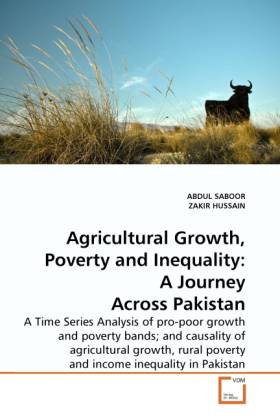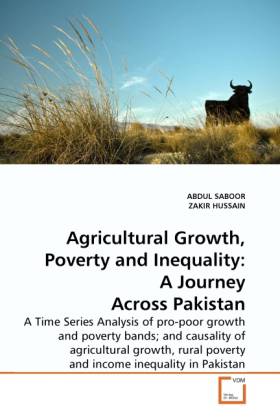
Door een staking bij bpost kan je online bestelling op dit moment iets langer onderweg zijn dan voorzien. Dringend iets nodig? Onze winkels ontvangen jou met open armen!
- Afhalen na 1 uur in een winkel met voorraad
- Gratis thuislevering in België vanaf € 30
- Ruim aanbod met 7 miljoen producten
Door een staking bij bpost kan je online bestelling op dit moment iets langer onderweg zijn dan voorzien. Dringend iets nodig? Onze winkels ontvangen jou met open armen!
- Afhalen na 1 uur in een winkel met voorraad
- Gratis thuislevering in België vanaf € 30
- Ruim aanbod met 7 miljoen producten
Zoeken
Agricultural Growth, Poverty and Inequality
A Journey Across Pakistan
Abdul Saboor, Zakir Hussain
Paperback | Engels
€ 58,45
+ 116 punten
Omschrijving
Pakistan is considered an outlier as far as poverty dilemma and its growth links are concerned. This book is finding out the dynamics of rural poverty and income inequality in Pakistan while assessing the impact of various factors on poverty status of households along with estimation of pro-poor growth scenarios across time and regions. The short term PEGR reveals that agricultural growth is anti-poor in Pakistan and in all provinces from 1990-91 to 1992-93 and in the subsequent years showed pro-poor growth in rural Pakistan. The regression model reflects that one percent increase in average household income reduces poverty by 0.25 percent at national level. Logit regression revealed that there is great likehood of low incidence of rural poverty with the increase in land use intensity, cropping intensity, agricultural growth, education and number of wage earners in a family. The findings suggest that the government should focus on poverty equivalent growth rate in agriculture sector rather than the actual GDP growth rates. In order to improve PEGR, the poverty alleviation policy must be in tandem with rationalincome distribution.
Specificaties
Betrokkenen
- Auteur(s):
- Uitgeverij:
Inhoud
- Aantal bladzijden:
- 156
- Taal:
- Engels
Eigenschappen
- Productcode (EAN):
- 9783639261189
- Verschijningsdatum:
- 27/06/2010
- Uitvoering:
- Paperback
- Formaat:
- Trade paperback (VS)
- Afmetingen:
- 152 mm x 229 mm
- Gewicht:
- 235 g

Alleen bij Standaard Boekhandel
+ 116 punten op je klantenkaart van Standaard Boekhandel
Beoordelingen
We publiceren alleen reviews die voldoen aan de voorwaarden voor reviews. Bekijk onze voorwaarden voor reviews.











